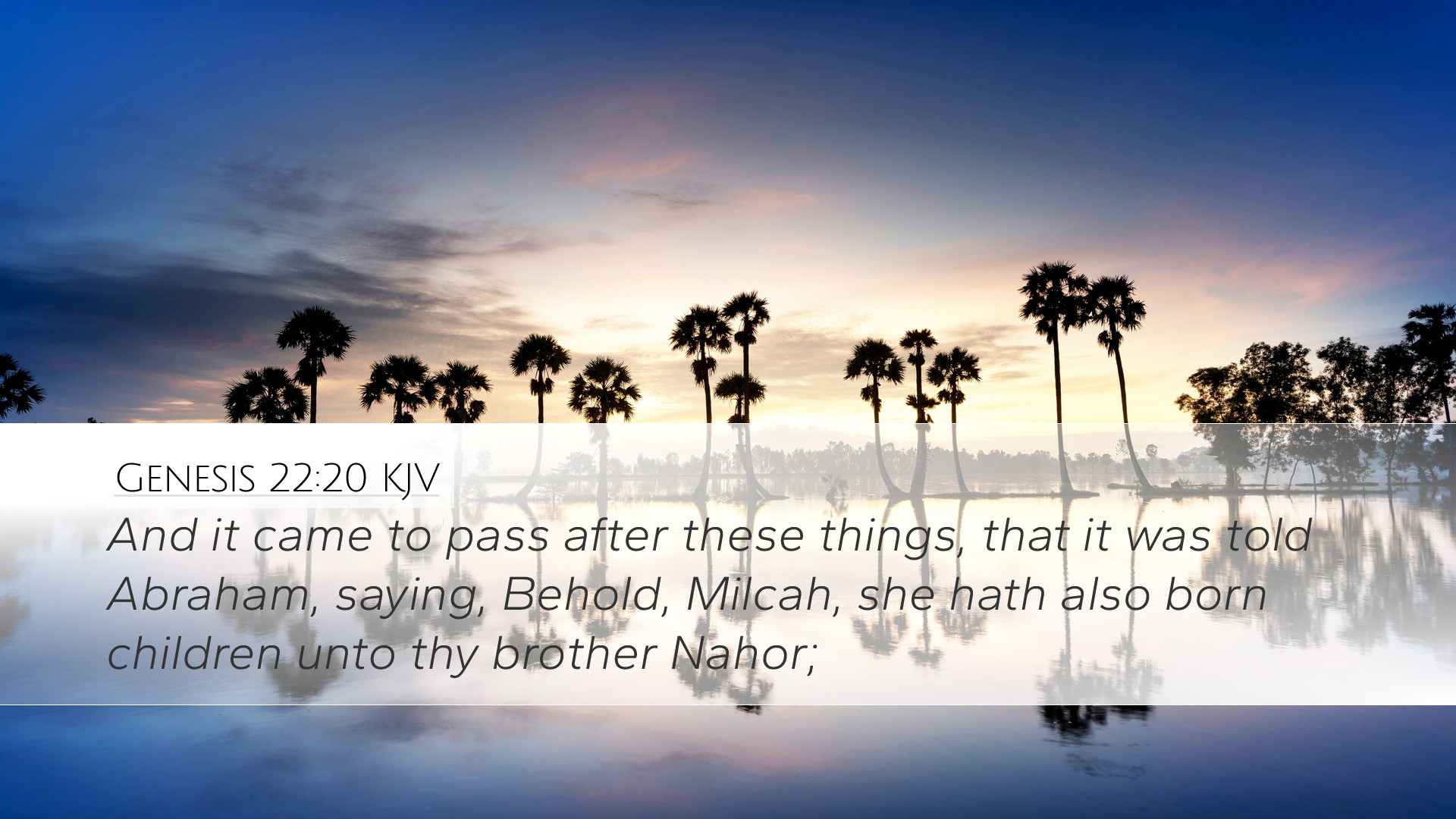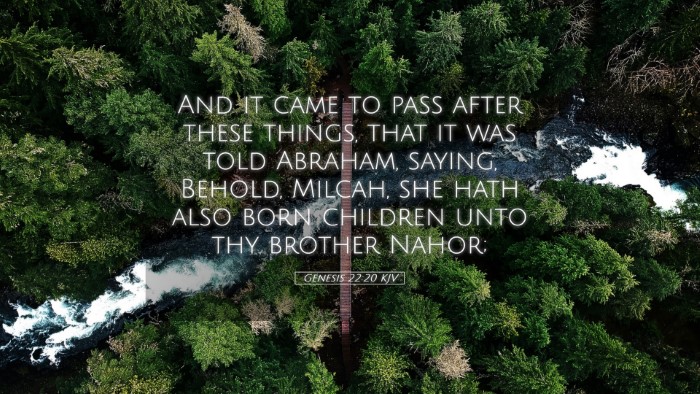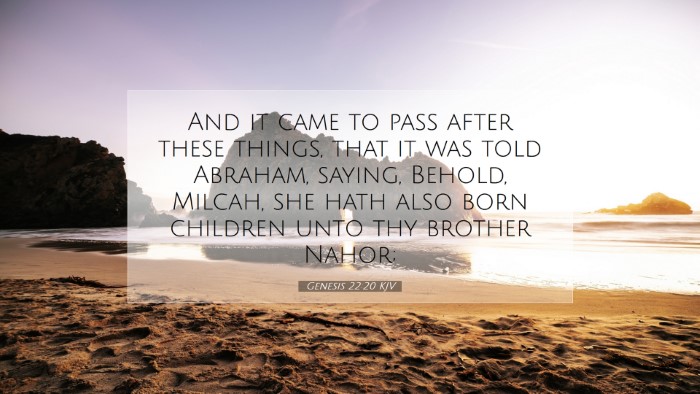Commentary on Genesis 22:20
Verse: "And it came to pass after these things, that it was told Abraham, saying, Behold, Milcah, she hath also borne children unto thy brother Nahor;"
Contextual Overview
Genesis 22 is one of the pivotal chapters in Scripture, often referred to as the "Akedah," or the binding of Isaac. It showcases profound themes of faith, testing, and divine provision. In this specific verse, there is a shift in focus from Abraham’s trial on Mount Moriah to a notification regarding his family lineage.
Insights from Public Domain Commentaries
Matthew Henry's Commentary
Matthew Henry emphasizes the importance of familial connections and divine interventions in this passage. He writes that the news of Milcah bearing children highlights God’s continued covenant promise not only to Abraham but also through his family. This verse, while brief, reminds us that God is actively involved in the lives of His people beyond the events of their personal trials.
- Significance of Milcah: Henry notes that Milcah—who is the wife of Nahor, Abraham’s brother—symbolizes the continuity of God’s plan through family ties. Her childbearing is indicative of the blessings promised to Abraham's lineage.
- Implications for Abraham: The information provided to Abraham serves as a reminder of his roots and the blessings that surround him. It establishes a connection between his immense sacrifices for God and the thriving continuation of his lineage, suggesting that God's covenant extends far beyond immediate challenges.
Albert Barnes' Notes on the Bible
Albert Barnes offers insights into the significance of Abraham's family. He points out that this notification of Milcah's children serves to contrast Abraham's current situation with that of his brother Nahor, thus reflecting on God's providence. Barnes suggests that while Abraham faced tests, God simultaneously ensured the fulfillment of His promises through others.
- God's Sovereignty: Barnes emphasizes God's governance over all aspects of life, suggesting that even in times of testing, God is working behind the scenes to fulfill His promises. The passage reassures believers that divine plans operate on a larger scale.
- Faith and Family: The mention of family is crucial, illustrating that while Abraham’s faith journey is arduous, it does not occur in isolation. There is a broader family narrative at work, and God remains faithful to His covenant with the house of Abraham.
Adam Clarke's Commentary
Adam Clarke notes the specificity of the mention of Milcah and her children, suggesting that this serves as an important reminder to Abraham of God’s continued favor and blessings upon his family. Clarke draws attention to the timing of the announcement, which follows a great trial, highlighting God's provision of joy amidst sorrow.
- Lessons in Timing: Clarke discusses the significance of receiving good news after a time of testing. This juxtaposition can serve as an encouragement for believers to remain steadfast, knowing that divine comforts often follow periods of hardship.
- Connection to God's Promises: He emphasizes that the multitude of descendants—being a part of God's promise—underscores the abundance of blessings that await those who are faithful, reinforcing the idea that God’s promises are multi-generational.
Applications for Pastors, Students, and Scholars
This verse, while specific and seemingly peripheral to the narrative of Abraham's binding of Isaac, contains layers of meaning that can be applied in various contexts:
- Encouragement in Trials: For pastors and students, the reminder that God is orchestrating blessings during difficult times can offer hope. Just as Abraham received news of life after his profound test, believers today are encouraged to expect God's providence in their lives.
- Understanding Divine Heritage: The emphasis on familial connections here can promote discussions on the importance of family in the Biblical narrative. This verse can lead to teachings on the role of legacy, lineage, and God's faithfulness to His promises across generations.
- Sovereignty of God: The broader theological teaching from this verse regarding God’s sovereignty can be a point for deeper study and reflection. Scholars may delve into the ways God works through human circumstances to fulfill His divine will.
- Interpersonal Relationships: The context invites exploration of how relationships within the church and the importance of community can reflect God’s ongoing work in the world.
Conclusion
Genesis 22:20 serves as a bridge between the intense spiritual experience of Abraham’s test and the assurance of divine continuity through his family. Public domain commentaries from Matthew Henry, Albert Barnes, and Adam Clarke provide a rich tapestry of thoughts that inform our understanding of God's complex and sovereign interactions with humanity.
Reflecting on this verse allows for personal and communal growth as believers recognize God's faithfulness that permeates all areas of life, including challenges, familial bonds, and the unfolding of His redemptive plan throughout history.


